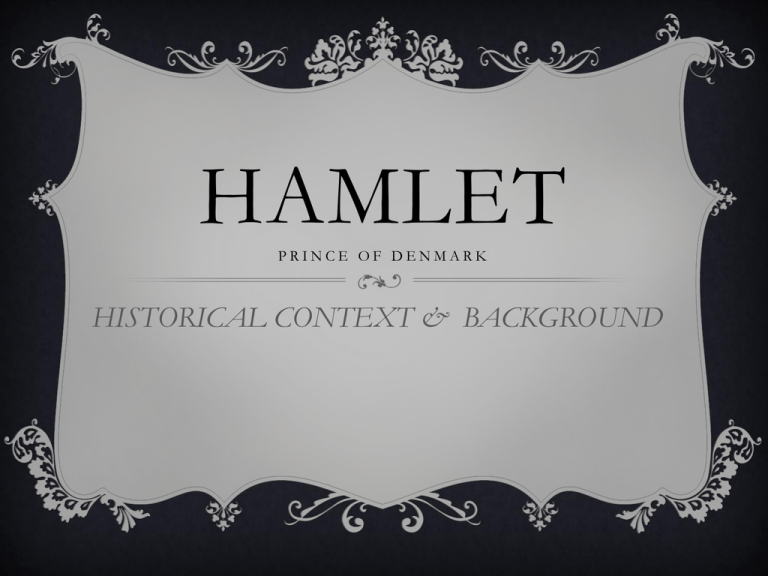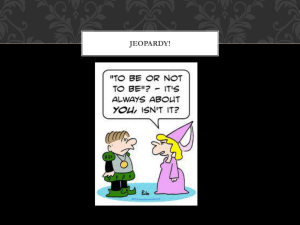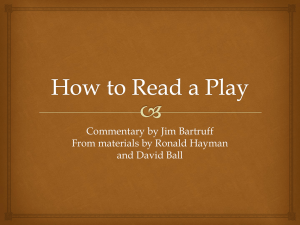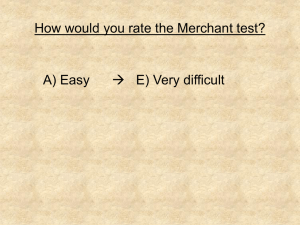HAMLET
advertisement

HAMLET PRINCE OF DENMARK HISTORICAL CONTEXT & BACKGROUND WILLIAM SHAKESPEARE (1564-1616) • Often regarded as the best English playwright and poet in history. • He was the leading shareholder and principal playwright for the acting company the “Chamberlain’s Men.” • Hamlet as well as Othello and King Lear were written for the Globe Theatre in London; one of four Renaissance theatres in the city. HISTORICAL CONTEXT Hamlet is believed to be written by Shakespeare and performed in theatres by 1603 after the English Reformation in the Elizabethan (Golden) Age of England. The Common Anatomy of an Elizabethan Theatre. The best known Elizabethan theatre is the Globe which was built and occupied by Shakespeare’s acting company The Chamberlain’s Men. ENGLISH REFORMATION The Catholic King Henry VIII was married to Catherine of Aragon but sought an annulment after they failed to produce a male heir. The Pope refused to annul the marriage and as a result the King separated all of England from the Roman Catholic Church. Immediately after Catherine’s death, Henry married Anne Boleyn in 1533. She gave birth to Elizabeth who later on became the Queen of England. Anne was beheaded by King Henry. Henry VIII is famous for causing political and religious unrest due to his wish to annul his marriage. He is also infamous for beheading all of his wives after they fail to give birth to boys. ELIZABETHAN (GOLDEN) AGE • Over 1 million people lived in London. • Queens Elizabeth I reigned from 1558-1603. • Elizabeth put a rest to the religious turmoil left by her father by the Elizabethan Religious Settlement in 1559. • English literature, poetry, theatre and music flourished. This time period is known as the Golden Age of England. • Shakespeare’s plays represented a movement towards breaking free of previous styles of theatre and entertainment spurred by the Renaissance’s encouragement of new ideas and thinking. ELIZABETHAN (GOLDEN) AGE CONT’D With the development of the English language as the accepted vernacular in England, English became a symbol of the nation and the Protestant national church. Mary Queen of the Scots was Elizabeth’s cousin and an important figure of the Elizabethan era. The Spanish Armada which was a fleet that tried to overthrow Queen Elizabeth was defeated by the English in 1588. IMPORTANT EVENTS 1450: Printing Press invented 1492: Columbus 1565: Conrad Gesner invents the pencil 1550: John Dee discovers the New World publishes Elements of Geometry in English 1510: Henlein 1543: John Dee invents the pocket watch creates a wooden robot 1568: Bottled Beer invented in London 1569: Map projection is invented 1582: Modern Calendar created IMPORTANT EVENTS 1593: Galileo CONT’D 1600: Gilbert invented invents Water thermometer publishes treatise on electricity & Magnetism 1588: Spanish 1589: Knitting 1609: Galileo 1583: Telescope Armada defeated by the English 1591: Flush toilet invented in England. Machine invented 1590: The compound microscope is invented. introduces telescope into astronomy THE STORY OF HAMLET “The story of Hamlet in some form is at least seven hundred years old. Hamlet appears first as Amlethus in the Historia Danica, written by Saxo Grammaticus in the twlefth century. The original source of the English play is a French story told in the Histoires tragiques of Francois de Belleforest, published in Paris in 1576. The outline of Belleforest’s story follows: ‘In pre-Christian times there was a Danish Prince called Horvendile, who was married to Queen Geruth. Their son was named Hamlet. Prince Horvendile was murdered by his brother Fengon, who thereupon married Queen Geruth. In order to escape from the tyranny of his uncle, Prince Hamlet pretended to be mad. Fengon was suspicious and tried to get the truth by sending a harlot to tempt Hamlet, but Hamlet was forewarned. Fengon send one of his councilors to hide secretly behind the arras in the Queen’s chamber so that he might overhear Hamlet’s cnversation with his mother. Hamlet came into the chamber, pretending in his madness to be a cock, and beating with his arms upon the arras he felt the eavesdropper. He slew him with his sword, cut the body in pieces, boiled them, and fed them to the hogs.’” BIBLIOGRAPHY Abrams, M. H., eds. The Norton Anthology of English Literature. New York: W.W. Norton Company Inc., 1968. Print. Burton, Raffel. Introduction. Hamlet. By William Shakespeare. 1601. New Haven: Yale UP, 2003. xv-xxxi. Print. Harrison, G. B. , ed. Shakespeare: The Complete Works. New York: Harcourt, Brace & World, Inc., 1968. Print. Maxwell, Julie. “Counter-Reformation Versions of Saxo: A New Source For Hamlet?” Renaissance Quarterly 57 (2004): 518-60 JSTOR. Web. 16 Feb. 2011











